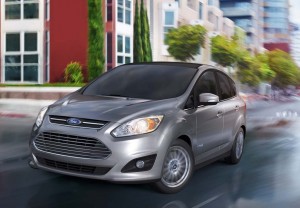Can Ford’s new “people-mover” topple the battery-powered king-of-the-hill?
The Toyota Prius routinely captures half of the hybrid market, and the Japanese maker has been gaining ground – despite the recent slide in U.S. fuel prices – by expanding the range of models wearing the Prius badge. But Ford hopes to finally make some inroads against Toyota with the launch of its new C-Max, the U.S. maker’s first dedicated hybrid-only model line.
The C-Max Energi, in particular, may have a good shot at taking down the new Prius Plug-in by offering a mix of better mileage, longer battery-only range and a lower price tag than the Toyota model.
According to the newly released, Ford expects to get a 95 MPGe Combined City/Highway rating from the EPA, and will average about 20 miles per charge. While that’s significantly less than the battery-only range of the Chevrolet Volt it’s nearly twice the range of the very limited Prius Plug-In.
And what Ford is hoping will prove particularly attractive to potential buyers is the price tag, which is also expected to come in lower than both the Volt and the Prius Plug-In. While Ford isn’t releasing that figure yet it notes that the more conventional C-Max Hybrid is priced at $25,995, “$1,300 lower than the Prius V,” the largest model in the expanding Prius line-up, and the one most comparable in interior space to the C-Max.
Precise mileage and range numbers have yet to be formalized by the EPA but Ford appears intent on besting its Japanese rival while offsetting the Volt’s definitive range advantage with a much lower price tag.
All three vehicles are using lithium-ion battery but the size of the costly packs used in each model has a strong influence on pricing.
While Ford has been producing hybrid-electric vehicles for nearly a decade it has remained an also-ran in a segment that still generates barely 3% of overall U.S. car sales. And Toyota routinely captures half of that volume, primarily with the Prius line.
The Japanese nameplate has built a reputation for reliability, as much as for its fuel economy. But analyst also credit Toyota’s decision to give Prius a distinctive body that is instantly recognizable. Most other battery-based vehicles simply stuff an alternative powertrain into an existing model.
The C-Max, already on sale in Europe using a conventional gasoline engine, will be sold in the States only as a battery model, either with a conventional hybrid or as a plug-in, dubbed Energi. Ford global marketing chief Jim Farley tells TheDetroitBureau.com that the maker believes that can be used to gain the same sort of advantage the unique shape of Prius has given Toyota.
The plug-in hybrid powertrain will also be offered in the Ford Focus, however, and in that version it’s expected to yield about 105 MPGe and slightly better range than the C-Max version.
Ford has promised to have five advanced battery-based vehicles on the road in the next several years. It first came out with a pure battery-electric version of its Transit Connect truck in late 2010 – though that model is now on hold as Ford’s powertrain partner Azure Dynamics recently went into bankruptcy. It launched a battery-electric version of the Focus in late 2011 and is just now ramping up production.
The Focus Energi and C-Max Energi are set to follow later this year. And Ford has yet to release details on its fifth battery car.

